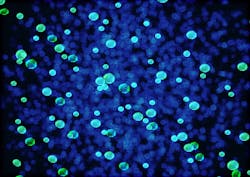CRAB cluster reported at hospital during COVID-19 surge
An unnamed 500-bed urban hospital in New Jersey reported a cluster of Carbapenem-resistant Acinetobacter baumannii (CRAB) infections during a surge in patients hospitalized with COVID-19, the Centers for Disease Control and Prevention (CDC) reported in its Morbidity and Mortality Weekly Report.
The hospital and the New Jersey Department of Health (NJDOH) conducted an investigation, and identified 34 patients with hospital-acquired multi-drug resistant CRAB infection or colonization from February to July 2020, including 21 (62 percent) who were admitted to two intensive care units (ICUs) dedicated to caring for COVID-19 patients.
Twenty (59 percent) incident cases were identified from clinical specimens and 14 (41 percent) through colonization screening.
In late March, increasing COVID-19-related hospitalizations led to shortages in personnel, personal protective equipment (PPE) and medical equipment, resulting in changes to conventional infection prevention and control (IPC) practices at the hospital, the CDC said. As COVID-19 cases declined in late May, the hospital resumed normal procedures, including standard IPC measures, and CRAB cases subsequently returned to a pre-COVID-19 baseline (zero to two cases per month).
“This outbreak highlights that MDROs (multi-drug resistant organisms) can spread rapidly in hospitals experiencing surges in COVID-19 cases and cause serious infections in this setting. To reduce spread of MDROs and the risk of infection for patients, hospitals should remain vigilant to prevent and detect clusters of unusual infections and respond promptly when they are detected. Facilities should prioritize continuity of core IPC practices (e.g., training for and auditing of hand hygiene, PPE use, and environmental cleaning) to the greatest extent possible during surges in hospitalizations and make every effort to return to normal operating procedures as soon as capacity allows,” the CDC wrote.

